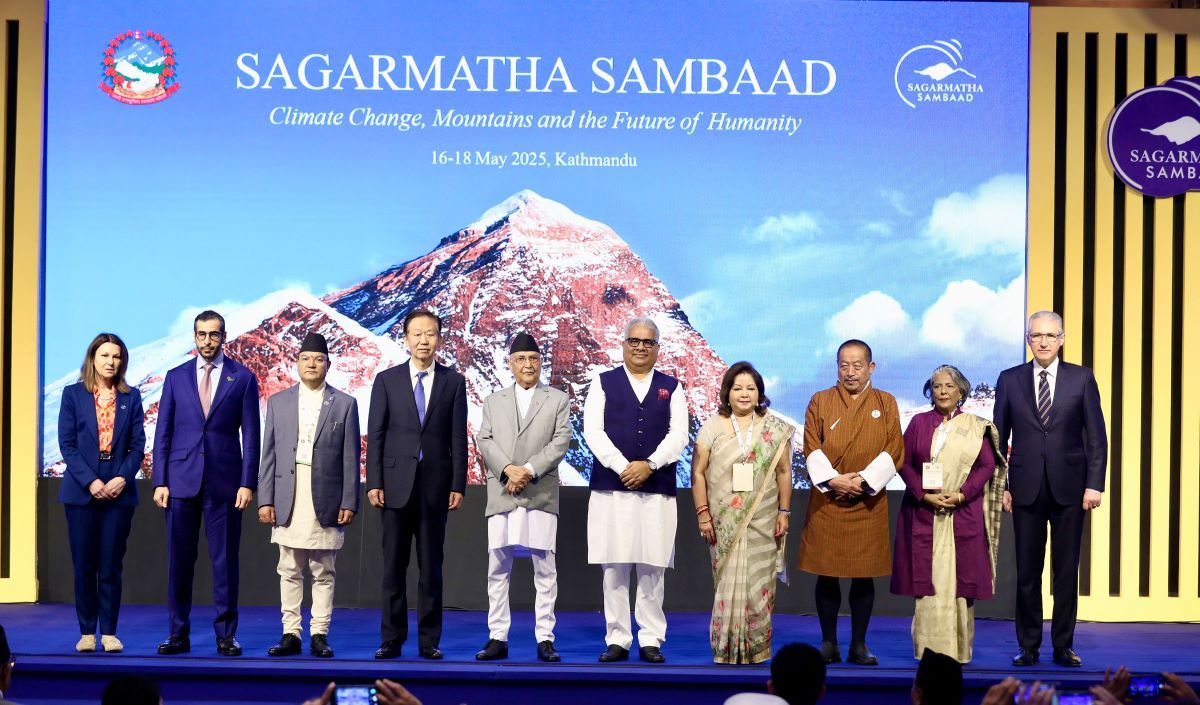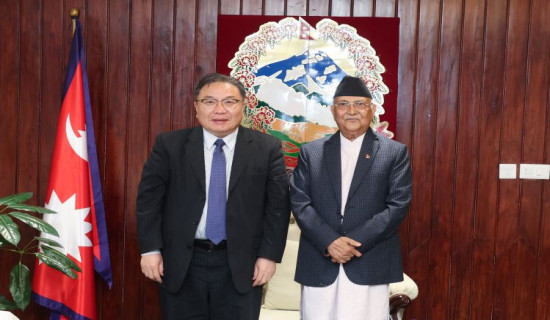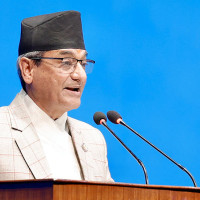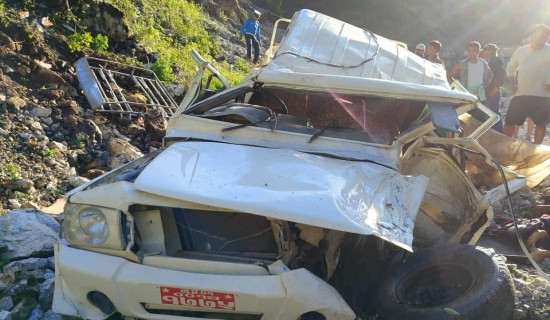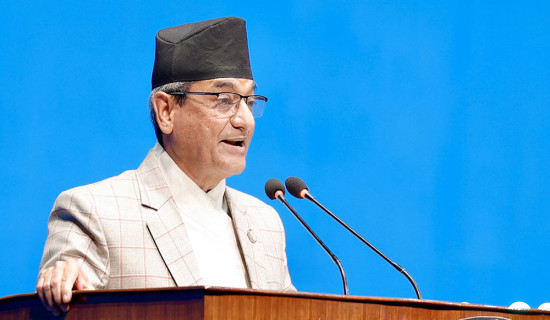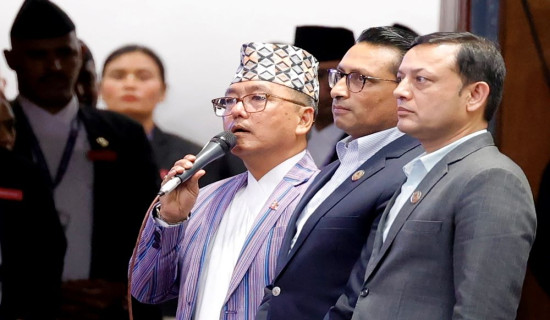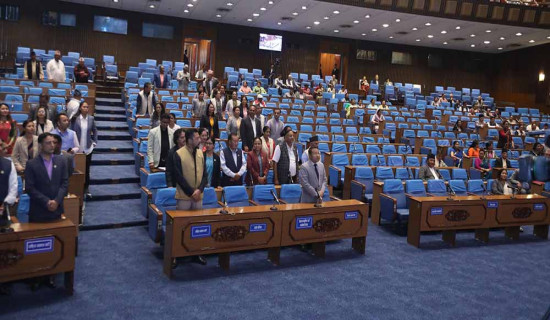- Saturday, 14 June 2025
Sagarmatha Sambaad
Nepal calls for global action to protect mountains, demands climate justice
Kathmandu, May 16: Minister for Forests and Environment, Ain Bahadur Shahi Thakuri, today addressed the plenary session of the Sagarmatha Sambaad that kicked off here today.
The session was themed “Climate Change, Mountains, and the Future of Humanity" where the Minister said ," Nepal, home to eight of the world’s fourteen highest mountains, bears a sacred responsibility to safeguard these natural sanctuaries."
Such mountains constitute part of what is often referred to as the “Third Pole”, a region that sustains one-fifth of humanity with freshwater, biodiversity, and spiritual vitality, he added.
"These mountains are not only majestic, but they are also essential climate regulator, yet, they now stand on the frontline of a rapidly intensifying climate emergency," the Minister reminded the forum.
He went on to say that the Himalayan landscape is transforming before our eyes." Glaciers are retreating. Ecosystems are shifting. Traditional ways of life are being upended. This is not a local crisis, it is a global one."
Highlighting the severity of climate change impacts on the Himalayas, he said," from the Himalayas to the Andes, from the Alps to the Rockies, the world’s mountains are under siege. The vulnerability is shared from highlands to islands."
What begins in the mountains ripples downstream, affecting river basins, agricultural plains, and coastal ecosystems. Indeed, the fate of humanity is intertwined with the fate of these mountains, according to the Minister who apprised the session that climate indicators are surpassing alarming thresholds.
According to the World Meteorological Organization, 2024 was the hottest in the past 175 years. The IPCC’s Sixth Assessment Report confirms that mountain regions are warming at twice the global average, he presented the facts.
In the last three years, we’ve seen the largest glacier mass loss on record. Sea levels are rising faster than in the past two decades. Many of these changes are irreversible, he added.
From retreating glaciers to increasing glacial lake outbursts, avalanches, floods, and shifting hydrological cycles, the consequences of climate change are widespread. The cryosphere is at risk like never before, threatening water security, food systems, and regional stability, the Minister said.
He further highlighted that "for Nepal, the stakes are especially dire. Our rugged topography itself amplifies our vulnerability. Fragile ecosystems, steep terrain, and rain-fed agriculture heighten our susceptibility to climate-induced disasters."
And it is the most vulnerable among us—smallholder farmers, women, indigenous communities, Dalits, children, and the elderly—who bear the heaviest burdens.
Despite our negligible contribution to carbon emissions, we face the full brunt of a climate crisis we did not cause. The costs for our socio-economic development are mounting. Climate change undermines our development aspirations, including our goal to graduate from the Least Developed Countries (LDC) category and achieve developed country status by 2043.
In 2023, Nepal’s per capita CO₂ emissions stood at just 0.57 tons, far below the global average of 6.76 tons, the Minister addressed the session, adding that our forests, covering nearly 46% of the country, act as vital carbon sinks and biodiversity havens.
Even in the face of daunting challenges, Nepal remains resolute in its climate leadership. We have embraced a justice-centered approach, embedding climate action into national planning. Our enhanced Nationally Determined Contribution (NDCs) is dedicated to achieving net-zero emissions by 2045—five years ahead of the global target.
Our National Climate Change Policy and National Adaptation Plan provide clear roadmaps to resilience, with sectoral strategies targeting agriculture, energy, water, infrastructure, and biodiversity.
Through a decentralized framework, local governments are empowered to spearhead climate action through Local Adaptation Plans of Action (LAPAs), ensuring the inclusion of women, indigenous peoples, and youth—voices that are vital yet often marginalized in climate discourse.
Nepal’s Community Forestry Program, largely led by women and indigenous communities, demonstrates how nature-based solutions can support both conservation and human development, he said. "Our approach is holistic - a just transition to a green economy, building climate-resilient infrastructure, and securing sustainable livelihoods."
Nepal, as a committed Party to the UNFCCC, Kyoto Protocol, and Paris Agreement, urges urgent and collective global climate action. Emphasizing the principle of Common but Differentiated Responsibilities and Respective Capabilities (CBDR-RC), the keynote speaker highlighted the importance of the Polluter Pays Principle and the need for climate finance that is new, additional, predictable, grant-based, and easily accessible.
He criticized the reliance on loans—over 70% of climate finance in 2020—saying it burdens vulnerable nations like Nepal and erodes trust. The unmet $100 billion climate finance commitment must be replaced with a credible and urgent $300 billion target, guided by justice.
Mountain nations like Nepal, facing rapid cryosphere degradation, must be prioritized. Loss and damage funding is seen not as charity but climate justice. Carbon markets are welcomed provided they uphold fairness, environmental integrity, and benefit local communities, the Minister said.
Mountains are vital ecosystems that support climate regulation, biodiversity, and billions of people, yet remain underrepresented in climate discourse. Nepal calls for a Global Alliance for Mountains and Cryosphere under the UNFCCC, and integration of mountain ecosystem services into global frameworks, the statement further added
The minister stressed that the “Early Warnings for All” initiative must extend to mountains, supported by robust monitoring, risk assessments, and adaptive strategies to build resilient mountain communities.
The cryosphere serves as the Earth’s early warning system, and preserving it is essential to limiting warming to 1.5°C. This is a moral imperative and a planetary necessity, the statement mentions
The statement concluded with a call for the Sagarmatha Sambaad to drive action, not just dialogue. Nepal urged the global community to act urgently, inclusively, and decisively, to safeguard mountains—the "soul of the planet"—for current and future generations. (RSS)

